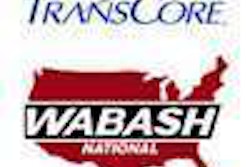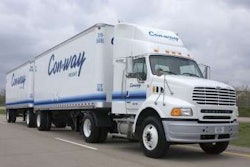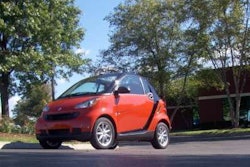The Long Beach Board of Harbor Commissioners has given preliminary approval to a proposal that would spur private investment in the Port of Long Beach Clean Trucks Program. Commissioners on Monday, March 23, backed a plan that would provide incentives to port truckers to acquire cleaner-running big-rigs — especially trucks that run on alternative fuels like liquefied natural gas (LNG).
The proposal — which will come back before the commission for final consideration next Monday, April 6 — would eliminate cargo fees on some trucks starting May 4 in response to the goods movement industry’s demand for privately financed big-rigs. It also drops the fee for those who buy port-subsidized trucks that run on LNG. The revisions are intended to help truck owners comply with the gradual phasing out of older, dirtier vehicles, as required by the CTP adopted by the Port of Long Beach.
“These changes will help keep the Clean Trucks Program on target to dramatically reduce pollution from port-related trucking in Southern California,” says James C. Hankla, president of the Long Beach Board of Harbor Commissioners. “The economy has changed, the drayage industry has changed, and we need to be proactive with our response.”
The CTP started Oct. 1 with a ban on 1988 and older trucks. On Feb. 18, the Long Beach port initiated a Clean Truck Fee of $35 per 20-foot container and $70 for larger containers to provide truck owners with financial assistance for replacement vehicles. In the current economic climate, many importers and exporters have favored truckers who privately finance clean trucks and therefore are not required to pay the Clean Truck Fee.
The changes to the CTP would eliminate the Clean Truck Fee for cargo hauled by the following:
In order to put more emphasis on LNG in the port-funded truck program, commissioners shelved an earlier proposal to reduce by 50 percent the fee for containers hauled by clean diesel trucks purchased with port assistance.
The proposed changes also are expected to ease the burden on industry by making the Clean Truck Fee exemptions similar at the ports of Long Beach and Los Angeles.
Using Clean Truck Fee revenues, the CTP offers grants and leases that cover as much as 80 percent of the cost of a new truck. Beginning Jan. 1, 2010, 1993 and older trucks will be banned from the port, and unretrofitted 1994-2003 trucks also will be banned. By Jan. 1, 2012, all trucks must meet 2007 federal emissions standards.
The U.S. Court of Appeals for the Ninth Circuit on Friday, March 20, ruled in favor of the American Trucking Associations in its lawsuit seeking an injunction against the ports of Los Angeles and Long Beach concession plans. The three-judge panel ruled unanimously to remand the case to the U.S. District Court and indicated that the judge should grant ATA an injunction against all or part of the concession plans.
The appeals court’s instructions to the federal district court made clear that many elements of the concession plans must be enjoined, but leaves it to the federal district court as to whether the entire concession plans should be halted. ATA didn’t challenge the ports’ CTP.











